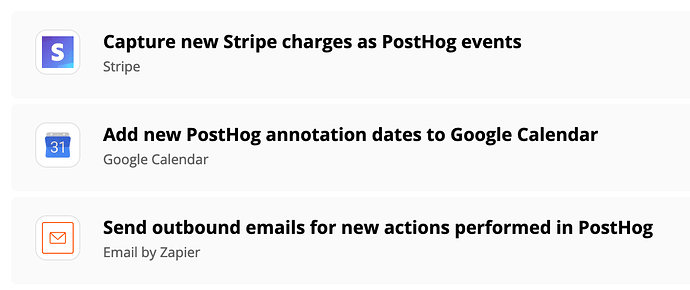Posthog.com is an open source alternative to product analytics tools like Mixpanel. It’s really cool and I’ve mentioned it to @maxT and @tanay in the past as a great example of a VC-backed open source company that really puts its github community of contributors at the centre of their ops.
More than that, it’s a self-hostable open source analytics tool which, alongside matomo.org, n8n.io, gitlab.com and a few other tools starts to look like a fully fledged alternative to common organisational needs — especially if they were seamlessly integrated with one another.
I’ve also mentioned n8n.io to Paolo Damico and they had n8n in their minds as something they should support, so they might be able to collaborate with you to build this sooner rather than later!
Some example workflows from Zapier
Primary usecase: log something as an event in Posthog
This one is pretty self-evident.
Secondary usecases: respond to new events logged to Posthog
I think Posthog relies on webhooks that you configure here but I could be wrong; what could be cool is to specify the schema of the different events:
Self-hosted vs cloud posthog instances
Like n8n there’s a self-hosted and a SaaS hosted option. It would be very cool if you were able to Auth in to https://app.posthog.com or your own self-hosted instance by specifying the domain and then conducting the login.
Posthog’s API
PostHog makes use of two different APIs, serving different purposes and using different mechanisms for authentication.
One API is used for pushing data into PostHog. This uses the ‘Team API Key’ that is included in the frontend snippet. This API Key is public, and is what we use in our frontend integration to push events into PostHog, as well as to check for feature flags, for instance.
The other API is more powerful and allows you to perform any action as if you were an authenticated user utilizing the PostHog UI. It is mostly used for getting data out of PostHog, as well as other private actions such as creating a feature flag. This uses a ‘Personal API Key’ which you need to create manually (instructions below). This API Key is private and you should not make it public nor share it with anyone. It gives you access to all the data held by your PostHog instance, which includes sensitive information.

